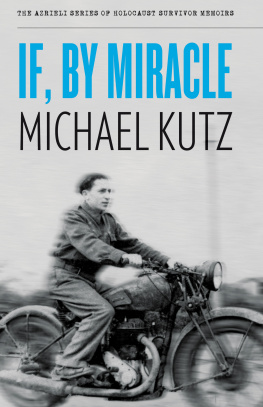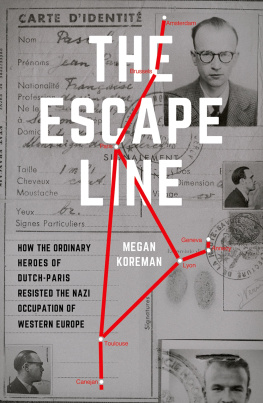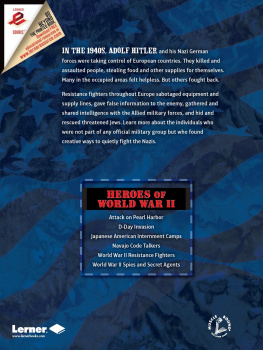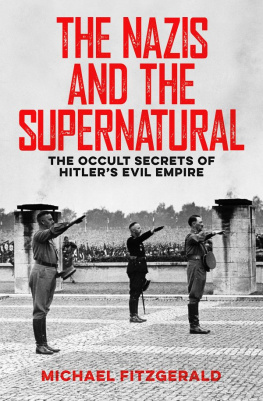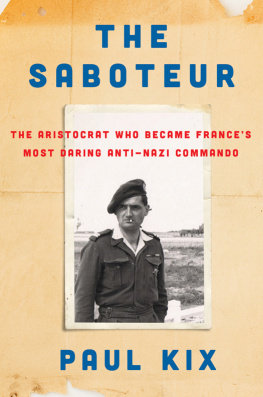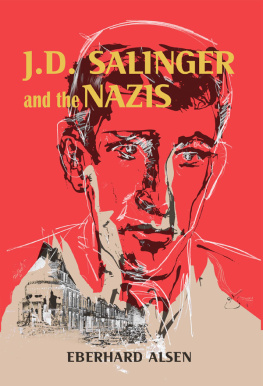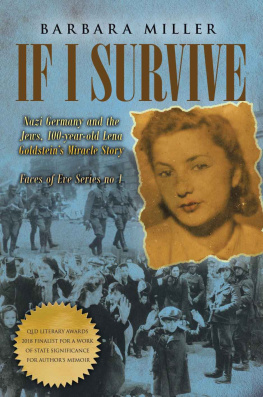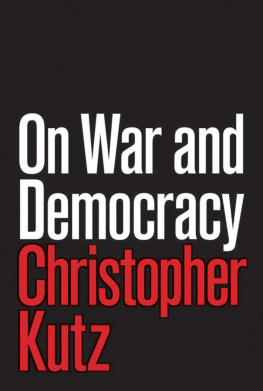Michael Kutz - If, by Miracle
Here you can read online Michael Kutz - If, by Miracle full text of the book (entire story) in english for free. Download pdf and epub, get meaning, cover and reviews about this ebook. year: 2013, publisher: Azrieli Foundation, genre: Politics. Description of the work, (preface) as well as reviews are available. Best literature library LitArk.com created for fans of good reading and offers a wide selection of genres:
Romance novel
Science fiction
Adventure
Detective
Science
History
Home and family
Prose
Art
Politics
Computer
Non-fiction
Religion
Business
Children
Humor
Choose a favorite category and find really read worthwhile books. Enjoy immersion in the world of imagination, feel the emotions of the characters or learn something new for yourself, make an fascinating discovery.
- Book:If, by Miracle
- Author:
- Publisher:Azrieli Foundation
- Genre:
- Year:2013
- Rating:5 / 5
- Favourites:Add to favourites
- Your mark:
- 100
- 1
- 2
- 3
- 4
- 5
If, by Miracle: summary, description and annotation
We offer to read an annotation, description, summary or preface (depends on what the author of the book "If, by Miracle" wrote himself). If you haven't found the necessary information about the book — write in the comments, we will try to find it.
If, by Miracle — read online for free the complete book (whole text) full work
Below is the text of the book, divided by pages. System saving the place of the last page read, allows you to conveniently read the book "If, by Miracle" online for free, without having to search again every time where you left off. Put a bookmark, and you can go to the page where you finished reading at any time.
Font size:
Interval:
Bookmark:

TRANSLATED FROM YIDDISH BY VIVIAN FELSEN
Doris Bergen, Chancellor Rose and Ray Wolfe Chair in Holocaust Studies, University of Toronto
Sara R. Horowitz, Director of the Israel and Golda Koschitzky Centre for Jewish Studies, York University
Nechama Tec, Professor Emerita of Sociology, University of Connecticut
Avner Shalev, Chairman of the Yad Vashem Directorate, Jerusalem
Naomi Azrieli, Publisher
Jody Spiegel, Program Director
Arielle Berger, Editor
Elizabeth Lasserre, Senior Editor, French-Language Editions
Aurlien Bonin, Assistant Editor / Researcher, French-Language Editions
Elin Beaumont, Outreach and Communications Manager
Tim MacKay, Social Media and Marketing
Susan Roitman, Executive Coordinator (Toronto)
Mary Mellas, Executive Coordinator (Montreal)
Mark Goldstein, Art Director
Nicolas Ct, Layout, French-Language Editions
Franois Blanc, Cartographer
In telling these stories, the writers have liberated themselves. For so many years we did not speak about it, even when we became free people living in a free society. Now, when at last we are writing about what happened to us in this dark period of history, knowing that our stories will be read and live on, it is possible for us to feel truly free. These unique historical documents put a face on what was lost, and allow readers to grasp the enormity of what happened to six million Jews one story at a time.
David J. Azrieli, C.M., C.Q., M.Arch
Holocaust survivor and founder, The Azrieli Foundation
Since the end of World War II , over 30,000 Jewish Holocaust survivors have immigrated to Canada. Who they are, where they came from, what they experienced and how they built new lives for themselves and their families are important parts of our Canadian heritage. The Azrieli Foundations Holocaust Survivor Memoirs Program was established to preserve and share the memoirs written by those who survived the twentieth-century Nazi genocide of the Jews of Europe and later made their way to Canada. The program is guided by the conviction that each survivor of the Holocaust has a remarkable story to tell, and that such stories play an important role in education about tolerance and diversity.
Millions of individual stories are lost to us forever. By preserving the stories written by survivors and making them widely available to a broad audience, the Azrieli Foundations Holocaust Survivor Memoirs Program seeks to sustain the memory of all those who perished at the hands of hatred, abetted by indifference and apathy. The personal accounts of those who survived against all odds are as different as the people who wrote them, but all demonstrate the courage, strength, wit and luck that it took to prevail and survive in such terrible adversity. The memoirs are also moving tributes to people strangers and friends who risked their lives to help others, and who, through acts of kindness and decency in the darkest of moments, frequently helped the persecuted maintain faith in humanity and courage to endure. These accounts offer inspiration to all, as does the survivors desire to share their experiences so that new generations can learn from them.
The Holocaust Survivor Memoirs Program collects, archives and publishes these distinctive records and the print editions are available free of charge to libraries, educational institutions and Holocaust-education programs across Canada. They are also available for sale to the general public at bookstores.
The Azrieli Foundation would like to express appreciation to the following people for their invaluable efforts in producing this book: Sherry Dodson (Maracle Press), Sir Martin Gilbert, Farla Klaiman, Naama Shilo from the photo archive department at Yad Vashem, Mia Spiro, and Margie Wolfe and Emma Rodgers of Second Story Press.
The following memoir contains a number of terms, concepts and historical references that may be unfamiliar to the reader. For information on major organizations; significant historical events and people; geographical locations; religious and cultural terms; and foreign-language words and expressions that will help give context and background to the events described in the text, please see the .
Except for the graves of my family and my few survivor friends, I no longer felt any attachment to Niewie.
In the summer of 1945, when Michael Kutz realized that his whole family had been wiped out, that there was no one left, he began a long journey in search of a new home. That summer marked the end of his youth in Niewie, a small town in present-day Belarus, ninety-five kilometres south of the capital, Minsk. The orphaned fourteen-year-old recognized that alongside his family, a whole world was gone the world now often compressed into the word shtetl: a town populated by a tightly knit Jewish community, its geography shaped by synagogues and religious schools, and its daily chatter inflected by competing visions of where and how Jews should live in the ancient homeland or within other societies around the world. The Nazi genocide had eradicated one of the possibilities; there were no more Jews in Niewie at the end of World War II .
Michael Kutz wrote his memoirs late in life and the sweeping breadth of his story takes us on a journey through twentieth-century Eastern European, Soviet, global, Canadian and Jewish history. Born in 1930 into a family of five, young Michael grew up in a decade that thoroughly transformed Jewish life in eastern Poland. Jews in the region struggled to maintain individual lives and communal cohesion amidst Europe-wide arguments about the status of national minorities, strong currents of antisemitism in Poland, increased overall secularization and urbanization, and, by the end of the decade, annexation and war.
Michael Kutzs description of life in his hometown of Niewie gives the reader a window onto these times. With a population of almost 7,000 inhabitants, among them some 4,000 Jews, Niewie exemplified the crystallized image of a shtetl and its transformation in the interwar period: a small Eastern European town with a strong Jewish presence, where Jewish tradesmen and artisans were the driving economic force. The Belorussians and Ukrainians living in the town spoke and understood Yiddish, and much of the daily and weekly life followed the rhythm of Jewish religious observance. Several synagogues and cheders (religious elementary schools) catered to the large Jewish community. The very existence of this community in eastern Poland was the result of restrictions imposed upon the Jewish subjects of the Russian Empire: after 1792, Jews were required to live within the confines of the Pale of Settlement, a region covering large parts of present-day Ukraine, Belorussia, Lithuania, Latvia, eastern Poland and the western parts of Russia. With the 1917 Russian Revolution, these restrictions were lifted and many Jews moved away from the former Pale, but many stayed and became citizens of Poland, the Soviet Union, or the other states that emerged from World War I and thus continued the strong presence of Jews in the area.
Niewie fell to Poland in 1918 and, as Michael Kutz describes, its Jewish community experienced the political trends in Polish society characteristic of the time in its very own way. Since the turn of the century, right-wing forces had been on the rise in Poland. This trend intensified during World War I and, again, during the economic crisis of the 1920s and 1930s. At that time, the right-wing nationalist party National Democracy (ND, Endecja) became an influential political force, and Polish nationalism with an insistence on creating a Poland of Poles i.e., of Catholics gained traction among major parts of society. The Endeks singled out Jews as un-Polish and blamed them for the rising unemployment, frequently calling for boycotts of Jewish businesses and condoning the regular violent attacks on individual Jews. By the mid-1930s, this type of nationalism found expression in state policies that imposed special taxes on Jews and Jewish businesses, prohibited the ritual slaughter required to maintain the Jewish dietary laws (largely to break the monopoly of Jewish butchers on the meat market), introduced entry limitations for Jews to Polish universities, and banished Jewish students to the so-called ghetto benches in the back of classrooms. More and more professional associations were closed to Jews, making it impossible for Jews to conduct business.
Font size:
Interval:
Bookmark:
Similar books «If, by Miracle»
Look at similar books to If, by Miracle. We have selected literature similar in name and meaning in the hope of providing readers with more options to find new, interesting, not yet read works.
Discussion, reviews of the book If, by Miracle and just readers' own opinions. Leave your comments, write what you think about the work, its meaning or the main characters. Specify what exactly you liked and what you didn't like, and why you think so.

